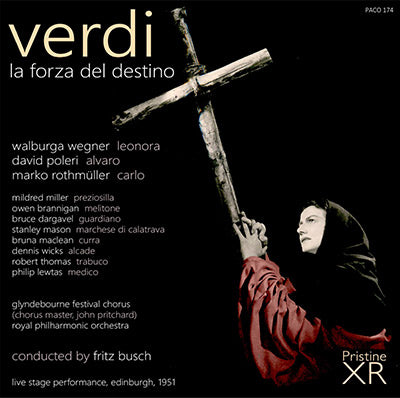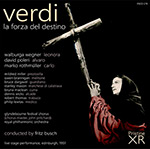
This album is included in the following sets:
This set contains the following albums:
- Producer's Note
- Full Track Listing
- Cover Art
The re-development of opera at Glyndebourne after the Second World War was a somewhat laborious affair. In a time when both Glyndebourne Opera and the audience had to restrict themselves in the way of expenditure on cultural matters, it was all the more important (a) to find a suitable partner (which developed in the Edinburgh Festival, mounted in 1947) and (b) to engage performers who might attract sufficient numbers of audience without compromising artistic standards. The preparation of the post-war Glyndebourne seasons saw an ecomonic re-building of repertoire, in part taking up pre-war productions but successively replacing them by new ones, in close co-operation with Edinburgh (the Mozart operas – again staged by Carl Ebert but with new designs now professionally supplied by renowned artists such as Oliver Messel, Rolf Gérard, Leslie Hurry and John Piper – remained one central core of repertoire). The sole non-Mozart pre-war production that was first taken from Glyndebourne to Edinburgh (in 1947) was Verdi’s Macbeth, with sets by German designer Caspar Neher, who had collaborated with Ebert as early as 1932 in Berlin, in a production of Un ballo in maschera, which had also been conducted by Fritz Busch (in 1938 he had designed the Glyndebourne Macbeth production, and was the designer of the 1949 Un ballo in maschera performances at Edinburgh, in which Busch had not been involved). Another project which was eventually re-shelved was a new production of Mozart’s Magic Flute, largely due to the problematic casting of some of the roles and the lack of attractivity of the opera when being performed in the original German language. Moving away from The Magic Flute likewise meant moving away from taking up Un ballo in maschera at Glyndebourne (a project which Busch took up separately in a 1951 German radio performance starring, amongst others, Martha Mödl and young Dietrich Fischer-Dieskau). La forza del destino by that time was an opera of Verdi’s not so frequently performed. There had been numerous considerations concerning the casting – and it was the first time since the war the Fritz Busch had again unlimited control over musical matters (within given financial bounds). The 1950 Glyndebourne season (and both the 1950 and 1951 Edinburgh seasons) had to a large extent been decided upon by the previous management, not least Rudolf Bing, who in 1950 began his work at the Metropolitan Opera of New York and thus had to leave both Glyndebourne and Edinburgh in other hands.
Busch and Ebert as well as the Glyndebourne management were always on the lookout for new talents (Busch stated two have had 120 auditions since summer 1950 for the 1951 season). Several names had been considered for the part of Leonora, including Marquita Moll, Carla Martinis, Birgit Nilsson and Rosanna Carteri, even Sena Jurinac, and only the Cologne radio broadcast of Un ballo in maschera convinced Busch that the German soprano Walburga Wegner was fully suitable for the role. In November 1950 Busch auditioned Mildred Miller at his New York home, to be considered a possible successor to Blanche Thebom as Dorabella and new Cherubino, but she quickly joined the Forza cast.
For the Alvaro, several big names were under discussion, amongst them Mario Del Monaco and Richard Tucker. Financial reasons eventually led to engaging young American tenor David Poleri, who had only made his operatic debut in 1950, and returned to Edinburgh as Alvaro in 1955. His career was cut short when he was killed, together with his wife, in a helicopter crash in December 1967 aged 46.
As the new production was to some extent to be cast by the same singers also performing in the other productions, the situation did not become easier. For a long time Busch had hoped to secure a young baritone from Munich, Benno Kusche, for both Melitone and Leporello (Kusche was eventually not released by the Munich State Opera which at about the same time held its own opera festival). And it took very long to get Marko Rothmüller to sign eventually his contract both as Guglielmo (a part he had already performed at Edinburgh in 1949) and Carlo di Calatrava.
Owen Brannigan, then a member of Sadler’s Wells Opera company, was a performer already well-known in Glyndebourne due to his participation in the 1946-8 seasons, performing Collatinus in the first performance of Britten’s The Rape of Lucretia, and Superintendent Budd in Albert Herring. But Busch did not know him, and had to be convinced to accept him as Bartolo in Le nozze di Figaro, eventually also agreeing to the part of Melitone, which was to be transposed for him a whole tone down. Ian Wallace, alternatively considered for Melitone in 1951, played the role in the 1955 revival at Edinburgh conducted by John Pritchard, then starring, apart from Poleri and Rothmüller, Sena Jurinac as Leonora, Hervey Alan as Guardiano and Marina de Gabarian as Preziosilla.
Bruce Dargavel, who had recently earned laurels singing in the then new movie adaptation of The Tales of Hoffmann, conducted by Sir Thomas Beecham, was suggested by the new General Manager of Glyndebourne, Moran Caplat, both as Guardiano and the Commendatore (Don Giovanni), after for various reasons Gottlob Frick, Sven Nilsson, Cesare Siepi, Silvio Maionica, Jerome Hines and Nicola Moscona had to be done without.
Some minor roles were cast from the Glyndebourne chorus (as had occasionally been the case from the 1930s, the most notable one being the promotion of Italo Tajo from the chorus to the role of Bartolo in 1935). The tiniest role was meticulously discussed, and the casting of choral singers (which had taken place in January under the supervision of assistant conductor John Pritchard) was the starting-point for some notable careers: in the 1951 chorus one was able to find names such as soprano Joan Stuart, contraltos Pamela Bowden and Helen Watts, tenors Emile Belcourt, John Carolan, Brychan Powell and Alexander Young, and basses David Kelly, Jeffrey Skitch and Dennis Wicks.
The fifth performance of the series, on 30 August, was broadcast live (Act III only) on the BBC Home Service, and the full opera repeated on BBC Radio 3 on 1 September. La forza del destino, specially devised for Edinburgh, never made its way to Glyndebourne, where the opera has never been staged yet. The performance is Fritz Busch’s last recording whatsoever; on 14 September 1951 he died, on his way to further conducting duties in Copenhagen, at the London Savoy Hotel.
La forza del destino is one of the rare cases when we have musical recordings from performances from the farther ends of Fritz Busch’s career. As early as on 12 September 1926, nearly exactly 25 years before the Edinburgh performance, Busch went into the recording studio with his Dresden Staatskapelle, to put on tape the overture, the battle music and the tarantella. Together with the Luisa Miller overture, which he put onto his concert programmes more than a dozen times and which has survived in a radio broadcast from 15 January 1947 (following a concert the previous day) in Chicago, they are Busch’s only Verdi orchestral operatic excerpts.
Jürgen Schaarwächter, Max-Reger-Institut with BuschBrothersArchive, Karlsruhe
The Busch Brothers Archive holds three copies of this recording, including two which have previously been issued on CD. By far the highest quality copy was a set of tape reels though these, like the CDs, were derived from the same BBC AM radio broadcasts as the aforementioned CDs. All three were almost complete but some small gaps remain at joins. In most cases it was possible to patch or edit these using applause and other background noise where appropriate, and though a very small number of bars of music is unfortunately permanently missing, I hope that only someone with intimate knowledge of the score will spot these omissions.
There were times where I had to patch the tape with a few bars from one of the previous CD issues, and despite my best efforts you will notice a drop in quality here. There was also some treble loss on one of the tape reels, though for the majority of the recording the tapes survive in reasonable condition. Additionally there was a whistle or whine commonly associated with old radio receivers which accompanied much of the recording and can be clearly heard throughout the previous CD issues. This has been almost entirely eradicated here.
Despite all these caveats the sound quality is remarkably good given the nature of the sources, as the extended online sample, taken from the end of the final act, amply demonstrates.
Andrew Rose
VERDI La Forza del Destino
Disc One
1. Sinfonia (7:04)
ACT ONE
The mansion of Leonora's family, in Seville
2. Buona notte, mia figlia (3:50)
3. Me pellegrina ed orfan (3:56)
4. Ah per sempre, mio bell'angiol (7:29)
5. Vil seduttore, infame figlia (2:24)
ACT TWO, SCENE ONE
An inn in the village of Hornachuelos
6. Holà! Holà! (3:25)
7. Al suon del tamburo (2:33)
8. Padre, eterno Signor (6:21)
9. Son Pereda, son ricco d'onore (2:26)
10. Sta bene! (2:29)
ACT TWO, SCENE TWO
A monastery nearby
11. Son giunta! Grazie, o Dio (6:32)
12. Chi siete? (2:51)
13. Or siam soli (7:26)
14. È fermo il voto (6:01)
15. Il santo nome di Dio Signore (4:30)
16. La Vergine degli angeli (2:41)
Disc Two
ACT THREE, SCENE ONE
A forest near Velletri, in Italy
1. La vita è inferno all'infelice (6:40)
2. O tu che in seno agli angeli (3:23)
3. Al tradimento (6:22)
ACT THREE, SCENE TWO
The officers' quarters
4. Solenne in quest'ora (6:12)
5. Urna fatale del mio destino (5:28)
ACT THREE, SCENE THREE
A camp near the battleground
6. Compagni, sostiamo (1:37)
7. Nè gustare m'è dato (7:54)
8. Lorchè pifferi e tamburi (2:57)
9. A buon mercato (3:16)
10. Toh! Toh! Poffare il mondo (4:05)
11. Rataplan! Rataplan! (3:21)
Disc Three
ACT FOUR, SCENE ONE
The monastery
1. Fate la carità (6:15)
2. Auf! Pazienza non v'ha che basti (2:30)
3. Del mondo i disinganni (3:02)
4. Invano, Alvaro (3:35)
5. Le minaccie, il fieri accenti (4:35)
ACT FOUR, SCENE TWO
A desolate spot near Leonora's hermitage
6. Pace, mio Dio (5:05)
7. Io muoio, confessione (2:39)
8. Non imprecare, umiliati (5:49)
BONUS TRACKS
VERDI La Forza del Destino
9. Sinfonia (6:40)
Matrix nos. 485, 486. Cat. No. Polydor 66431
10. Battle Music (1:33)
11. Tarantella (1:51)
Matrix nos. 491. Cat. No. Polydor 66430
Kapelle der Staatsoper Dresden
Recorded September 1926, Dresden
12. VERDI Luisa Miller - Sinfonia (5:09)
From Acetate disc "Rarissima 15" in the collection of Gert Schäfer and Klaus Schöler
Chicago Symphony Orchestra
Recorded Orchestra Hall, Chicago, 15 January 1947
CAST
Walburga Wegner (Leonora)
Mildred Miller (Preziosilla)
David Poleri (Alvaro)
Marko Rothmüller (Carlo)
Owen Brannigan (Melitone)
Bruce Dargavel (Guardiano)
Stanley Mason (Marchese di Calatrava)
Bruna Maclean (Curra)
Dennis Wicks (Alcade)
Robert Thomas (Trabuco)
Philip Lewtas (Medico)
Glyndebourne Festival Chorus
(chorus master, John Pritchard)
Royal Philharmonic Orchestra
conducted by Fritz Busch
Recorded: King’s Theatre, Edinburgh, 30 August 1951
Stage direction: Carl Ebert; Design: Leslie Hurry
Choreography: Sigurd Leeder
XR remastered by Andrew Rose
Cover artwork based on a photograph of Walburga Wegner as Leonora
Total Duration: 2hr 51:54
CD1: 71:55 CD2: 51:15 CD3: 48:43
Special thanks to Dr. Jürgen Schaarwächter
Produced in co-operation with the Max-Reger-Institut/BuschBrothersArchive, Karlsruhe, Germany

